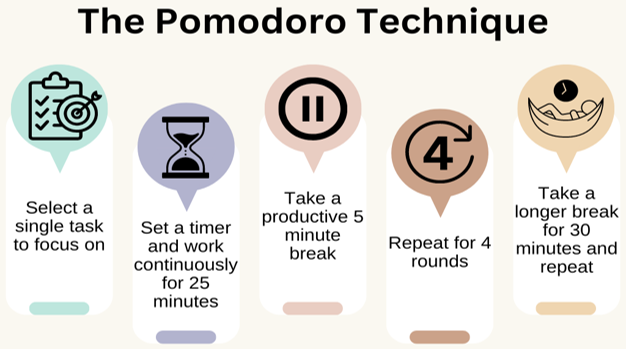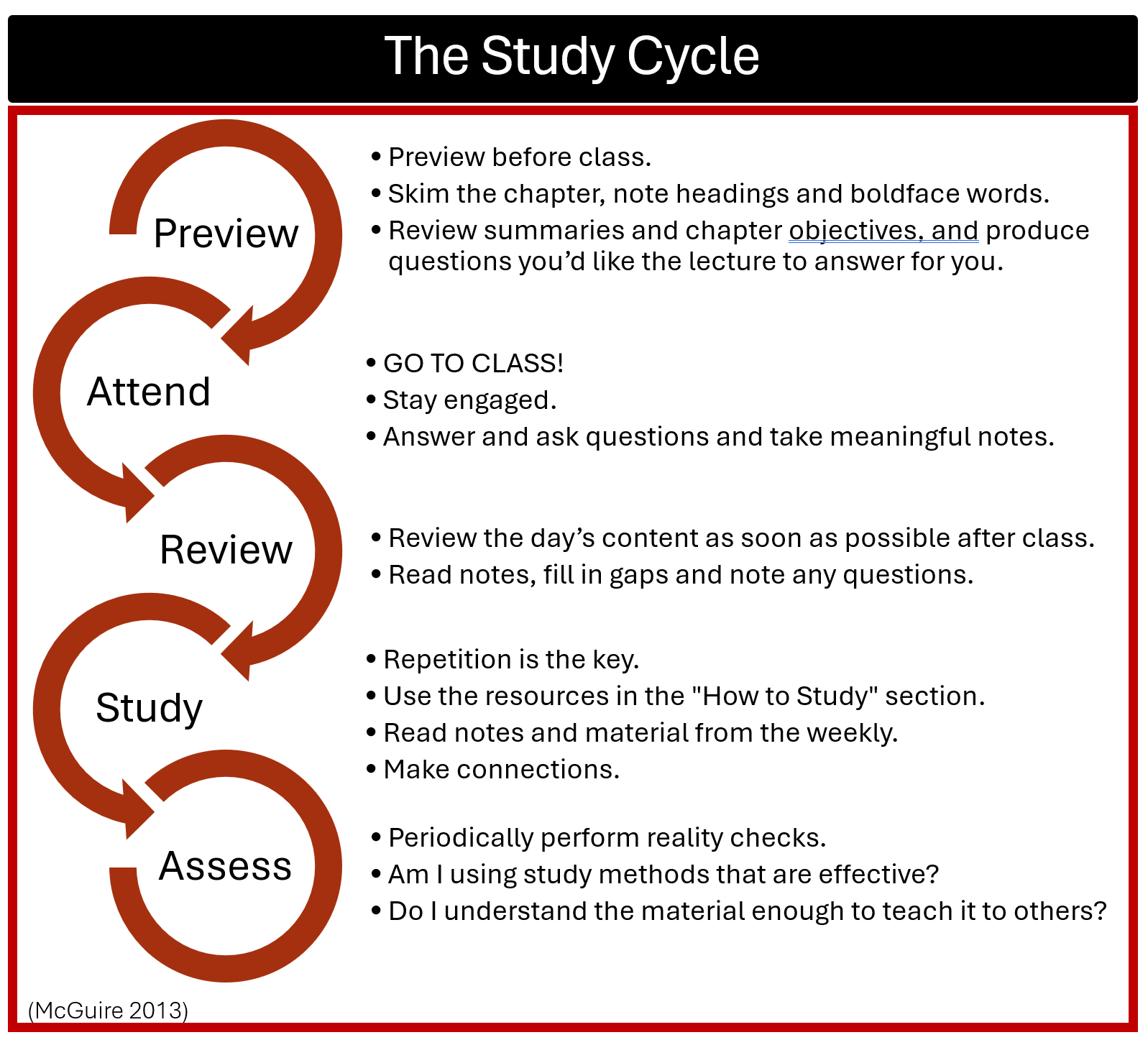Manage Your Time to Study with a Plan & Purpose
An organized approach will help you in all aspects of course performance, not just studying. But because study time is precious, it's particularly important to plan for it and to be well organized. Use the tools below to purposively set aside time in your schedule to study throughout your course (not just during exam time). There are also a few that help you stay focused while you study and make the best use of your time. Whatever tools or tricks you decide to use, remember to do so with a plan and with a purpose. The steps below will help!
Setting Goals Helps You Adopt the Right Mindset for Achieving Success
Study Strategy Goals
- Complete at least 3 practice questions per major topic from past exams or review sheets.
- Create flashcards for 20 key vocabulary terms and test yourself daily.
- Draw diagrams (e.g., rock cycle, plate boundaries) from memory and label them correctly.
- Teach a concept to a classmate or friend, focusing on clarity and key terms.
- Attend at least one study group session before the exam to review tricky concepts.
Think About All the Resources You May Need
- Course Materials: syllabus, textbook chapters, notes, PowerPoint lectures, assignments (in-class and HW)
- Syllabus calendar (exam dates)
- Academic Calendar (final exam dates)
- Personal schedule (class times, work hours, activities)
Start with a Content Outline to Determine Topics & Tasks
- Identify your main topic or goal first.
- Ask: “What is the purpose of this outline? What am I trying to explain or learn?”
- Use major headings for key themes or sections.
- Break each major point into supporting ideas or subtopics using bullet points or sub-bullets.
- Follow a consistent structure (e.g., Roman numerals → capital letters → numbers → lowercase letters).
- Write phrases or short sentences instead of paragraphs.
- Avoid unnecessary detail—focus on keywords that trigger your understanding.
- Make sure you know and understand the definition of ANY word or term you write down.
- Chronological Style (e.g., historical events)
- Causal Style (cause and effect)
- Thematic Style (grouped by subject)
- Problem–solution or Question–answer Style
- You can also mix these as appropriate.
- For complex terms or theories, jot down a brief definition or example.
- This helps clarify abstract concepts when reviewing later.
- Use bold, underline, or different colors to draw attention to essential terms.
- This improves scanning and prioritizes important content.
- Add blank space or extra bullets for new ideas or notes.
- Your outline can evolve as you deepen your understanding.
- Consider using concept maps or diagrams for visual learners.
- Indentation and alignment can help you visualize the relationships among ideas
Other Tips for Developing Tasks
- If your exam covers 3 chapters, you might have a solid outline for each one.
- Once you have a good outline, you can target each item purposefully during study sessions.
- Make a note of any learning/study preferences (e.g., in the morning, at the library, etc.)
- Break each course into major units or concepts (e.g., atomic structure, bonds, reactions)
- Create an outline, noting specific terms or concepts under larger categories
- Match each study topic with a good study tool or task you want to complete
Time Management Advice
- Do a time audit: Track one week of your time or estimate availability
- Block out fixed commitments (classes, meals, job)
- Find open blocks for studying (aim for 2–3 focused hours/day)
- Use time blocking: Assign specific study tasks to time slots
- Plan for spaced repetition: Review topics multiple times across the week
- Schedule active learning: practice tests, diagrams, teaching others
- Use tools to help with scheduling
Useful Tools & Techniques
-
Todoist – A versatile to-do list app that helps organize tasks with priorities and deadlines.
🔗 Todoist -
Microsoft To Do – Integrates seamlessly with Microsoft 365, allowing task creation and synchronization across devices.
🔗 Microsoft To Do -
MyStudyLife – Designed specifically for students to manage classes, assignments, and exams in one place.
🔗 MyStudyLife -
Notion – An all-in-one workspace for notes, tasks, and databases, offering customizable templates for students.
🔗 Notion -
Remember The Milk – A straightforward task manager with smart lists and reminders to keep you on track.
🔗 Remember The Milk
-
Toggl Track – Simple time tracking with detailed reports to analyze how you spend your study hours.
🔗 Toggl Track -
Clockify – A free time tracker and time sheet app that's great for monitoring study sessions.
🔗 Clockify -
Forest – A unique app that encourages focus by growing virtual trees as you study, discouraging phone use.
🔗 Forest -
RescueTime – Automatically tracks app and website usage to help identify distractions and improve productivity.
🔗 RescueTime -
Athenify – Tailored for students to log study hours and monitor academic progress effectively.
🔗 Athenify
Class Tracker Ultimate Student Planner
-
Why it’s great: Designed specifically for students, featuring sections for assignments, exams, and self-care.
-
Price: Approximately $23.
Plum Paper Student Planner
-
Why it’s great: Offers extensive customization, allowing you to tailor sections to your academic needs.
-
Price: Starting around $35.
Papier Academic Year Planners
-
Why it’s great: Stylish designs with practical layouts, including term timetables and deadline trackers.
-
Price: Approximately $35.
The Happy Planner – Student Collection
-
Why it’s great: Customizable disc-bound system with various accessories and layouts.
-
Price: Varies based on selection.
Plan Well & Be Adaptive
- Stick to a consistent routine and location
- Use cues (music, setting) to trigger study mode
- End each week with a short reflection: What worked? What didn’t? What should I adjust?
- Update your schedule based on new due dates, test scores, or workload
The week-long example study plan below is for chemical bonds, but can serve as a template for any concept. It uses many metacognitive concepts discussed in the Study Tips section. AI is a useful tool to develop plans like these. Here is the prompt used to generate the plan below: "Make a seven-day college-level study plan for understanding chemical bonds, using evidence-based study techniques, for about 1.5 hours a day." You can feed textbook chapters or notes into your prompt as well as more specific content for intense study sessions. As always, take caution that the advice provided matches your course, content, and guidelines from your professor. Be sure to follow the study cycle and steps above to optimize your study time!
Some of the links on this page may require additional software to view.



